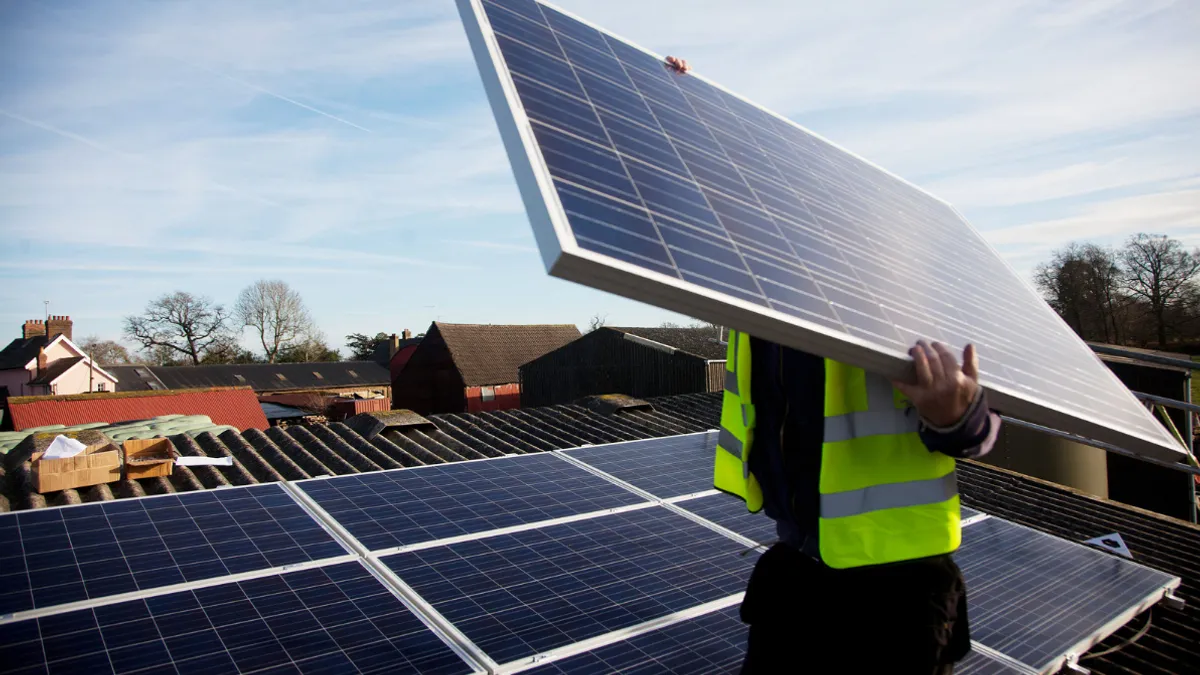Dive Brief:
- The Alabama Public Service Commission (PSC) agreed on Tuesday that Alabama Power’s monthly "capacity reservation charge" added to the bills of customers with home solar arrays is reasonable and "based on actual metered data," based on a staff analysis of the utility's study and modeling.
- The decision comes in response to a formal challenge that the extra monthly charge, intended to reimburse the utility for providing power to solar-equipped homes when the sun is not shining, is designed to thwart home solar development. However, the commission agreed with Alabama Power that the fee was too low, and should be increased from $5/kW to $5.41/kW, according to the meeting agenda.
- The PSC, which will issue a formal order in two to five weeks, asked Alabama Power to develop "a demand rate option" within 12 months, for residential customers who are now paying the extra charge because they own home generation. The commission and the utility did not provide a detailed explanation of how that new rate would work.
Dive Insight:
Tuesday’s decision by the Alabama PSC caps a nearly two-year battle waged by the Southern Environmental Law Center (SELC) on behalf of GASP (the Greater Birmingham Alliance to Stop Pollution) in cooperation with a Birmingham law firm representing two Alabama residential customers. That struggle included a heavily-attended formal public hearing in November 2019 featuring expert testimony by a witness for SELC who testified that he knew of no other state with a surcharge as high as the one charged by Alabama Power.
Utility pushback on home solar installations is a national trend, as more residential customers install larger and larger arrays while maintaining their connection to the utility distribution system. Utilities argue that they face decreasing revenues while the expense of maintaining their delivery systems remains. And in a regulated state such as Alabama, customer solar also means declining sales of the power that the vertically integrated utilities generate.
The stakes in this battle, however, seem disproportionate to the two-year fight which has ensued. Alabama Power, a Birmingham-based subsidiary of Southern Company, serves about 1.4 million customers, including about 1.2 million residential customers. Only about 200 of the company’ residential customers have installed home solar arrays, according to Alabama Power. That alone proves that the surcharge is working to prevent home solar, opponents have argued in pleadings and during a public hearing.
They argue the solar surcharge began in 2013 to keep customer solar generation in check, and that this decision will only strengthen that measure. And that barrier increases as, per the PSC's decision, a home with a 5 kW array would pay an extra $27.05 per month, if the fee increase goes into effect.
"Today’s decision hurts Alabama Power customers and our state," said Keith Johnston, Birmingham office director of SELC’s Alabama office in an email. "As the nation moves forward with cleaner energy and the jobs that it creates, the Commissioners and Alabama Power continue to do everything they can to stop it."
The company counters that the surcharge is just a variation of fees the company created 25 to 30 years ago to deal with customer-based generation.
In an email, company spokesperson Michael Sznajderman said Alabama Power is "pleased with the vote, which validates our longstanding position: that customers with on-site generation who want backup service from the grid should pay the cost for that service. If not, other customers would unfairly pay the costs for those individuals and businesses."
The utility is counting on instantly providing electricity to solar-equipped homes at night, on rainy days or during equipment failures.
The decision by Alabama regulators comes just four months after the Kansas Supreme Court reversed a decision by the Kansas Corporation Commission, subsequently upheld by a circuit appeals court, approving a higher residential rate for customers with home solar. Topeka-based utility Evergy called those customers "free riders."
The Kansas Supreme Court suggested the company find other ways to deal with the "free rider problem" without creating discrimination, for example, by restructuring rates with a flat monthly fee on every bill to cover the fixed costs of maintaining the distribution system.
No decision has been made about an appeal in the Alabama case.














